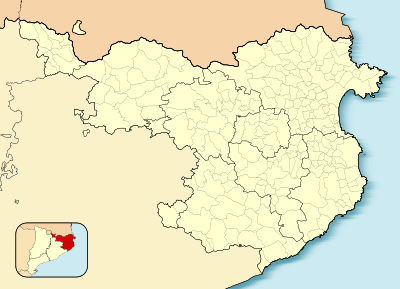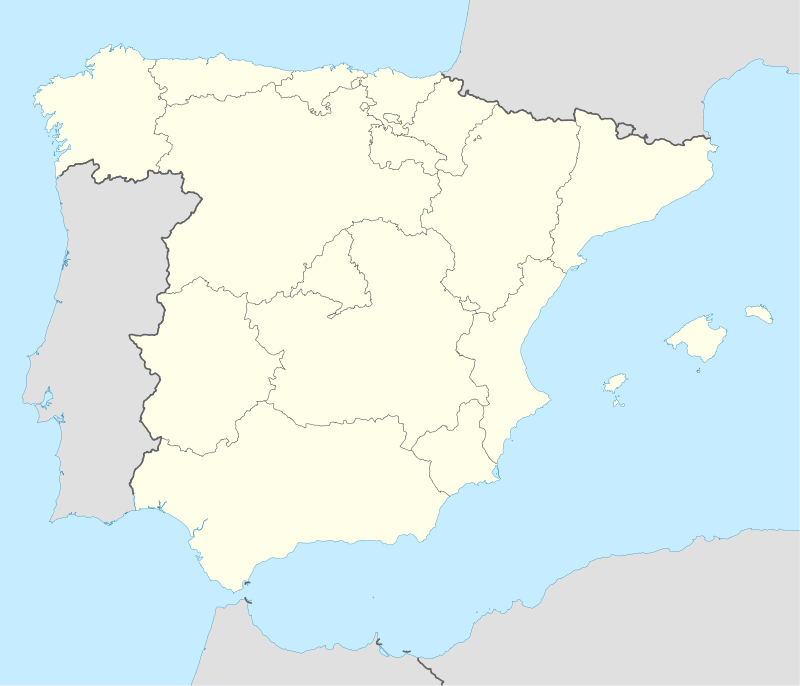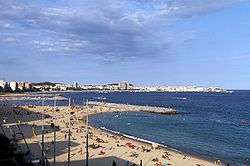Palamós
| Palamós | ||
|---|---|---|
| Municipality | ||
|
View of Palamós from the beach of Sant Antoni de Calonge | ||
| ||
 Palamós  Palamós Location in Catalonia | ||
| Coordinates: 41°51′N 3°08′E / 41.850°N 3.133°ECoordinates: 41°51′N 3°08′E / 41.850°N 3.133°E | ||
| Country |
| |
| Community |
| |
| Province | Girona | |
| Comarca | Baix Empordà | |
| Government | ||
| • Mayor | Lluis Puig Martorell (2015)[1] | |
| Area[2] | ||
| • Total | 14.0 km2 (5.4 sq mi) | |
| Elevation | 30 m (100 ft) | |
| Population (2014)[1] | ||
| • Total | 17,805 | |
| • Density | 1,300/km2 (3,300/sq mi) | |
| Demonym(s) | Catalan: Palamosí (m) Palamosina (f) | |
| Website |
www | |
Palamós (Catalan pronunciation: [pəɫəˈmos]) is a town and municipality in the Mediterranean Costa Brava, located in the comarca of Baix Empordà, in the province of Girona, Catalonia, Spain.
History
Palamos was founded and recognised as a village on 3 December 1279 by 'Pere el Gran', 'Comte de Barcelona' (Peter III of Aragon). He wanted to found a new port on the coast as the previous royal port in the region at Torroella de Montgrí on the River Ter had silted up.
Evidence of an early settlement lies around 1.7 kilometres (1.1 mi) north-east of the town, on a rocky promontory at the north end of Platja de Castell beach. The Castell de la Fosca is a stone settlement of the Iberian Indigetes people which dates from the 6th century BC.
Features
Palamós is located at the northern end of a large bay, which is popular for swimming, sailing and windsurfing. The town is by-passed by the C31 which connects the coastal towns of the central Costa Brava with Girona. Palafrugell lies 8.5 km to the north and Castell-Platja d'Aro 7 km to the south.
The town is a major port (with the closure of Sant Feliu the only commercial harbour in the Province of Girona) with one of the last remaining fishing fleets on this part of the Mediterranean coast. It is famous for the locally caught prawns from Palamós (Catalan: gambes).[3]
The town's major economic activities until the second half of the 20th century were fishing and cork manufacturing. In the sixties, however the town saw a rapid growth of tourism. The architecture of Palamos itself remained relatively unchanged with most development focused to the south at Sant Antoni de Calonge which now merges with Palamos. The town's nightlife is focused on the old port which is surrounded by bars and restaurants.
The town is home to Palamós CF the local football club. They share their ground, the Estadi Palamós Costa Brava with the small, but over-achieving club UE Llagostera, as the club's stadium, Estadi Municipal de Llagostera, didn't meet the LFP criteria.
It was the birthplace of Frederic Pujulà i Vallès who was a pioneer of Esperanto literature.
Gallery
 Palamós
Palamós The port; in the background a forest fire near Platja d’Aro
The port; in the background a forest fire near Platja d’Aro The church Santa Maria del Mar
The church Santa Maria del Mar

See also
References
- 1 2 "Ajuntament de Palamós". Generalitat of Catalonia. Retrieved 2015-11-13.
- ↑ "El municipi en xifres: Palamós". Statistical Institute of Catalonia. Retrieved 2015-11-23.
- ↑
- Panareda Clopés, Josep Maria; Rios Calvet, Jaume; Rabella Vives, Josep Maria (1989). Guia de Catalunya, Barcelona:Caixa de Catalunya. ISBN 84-87135-01-3 (Spanish). ISBN 84-87135-02-1 (Catalan).
External links
| Wikimedia Commons has media related to Palamós. |
 |
Forallac | Vall-llobrega | Mont-ras |  |
| Calonge | |
|||
| ||||
| | ||||
| Balearic Sea |

